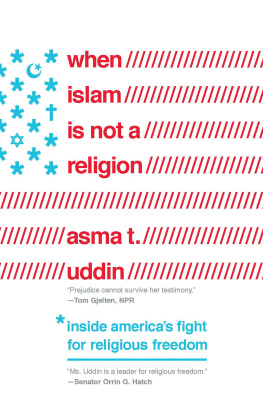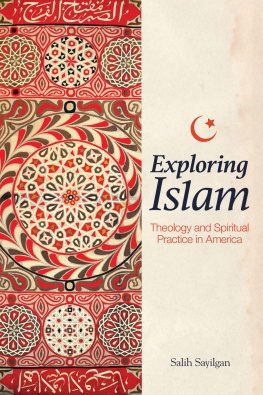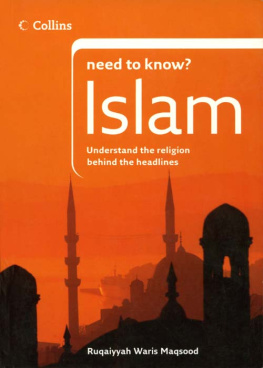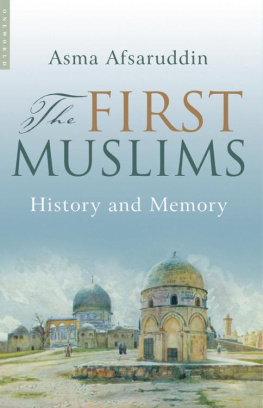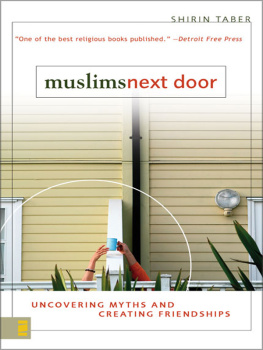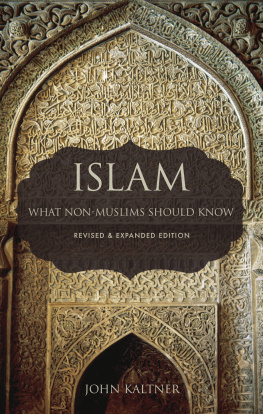
when
islam is not
a religion
INSIDE AMERICAS FIGHT
FOR RELIGIOUS FREEDOM
ASMA T. UDDIN

PEGASUS BOOKS
NEW YORK LONDON
For my father

On Presidents Day 2019, I was invited to speak at the Museum of the Bible in Washington, DC, about our Founding Fathers commitment to religious liberty for all. Part of a diverse panel, I was the Muslim speaker alongside the Jewish and Christian voices. The others spoke of George Washington; I focused on Thomas Jefferson.
In the founding-era debates, there were two rival conceptions of the nations identity, I said. Preserving the Protestant status quo or guaranteeing individual rights regardless of religion. The Founders chose the latter. Jefferson in particular wanted to study other cultures and learn from their successes and failures. He made it a point to purchase a Quran, which he owned because it helped him better advocate for the acceptance and enfranchisement of Muslims in America.
Jefferson didnt know of any Muslims living in the US during his time (though recent research has revealed that almost 20% of the slaves in America were Muslims) but he still explicitly considered the rights of potential Muslim inhabitants of the nation. In fact, as scholar Denise Spellberg has noted, when the future, imagined Muslims figured into the Founders debates, they served as a sort of litmus test or indicator of what America was meant to be.
If you consider that anti-Muslim stereotypes at the time were entrenched and widespread, I said, its truly startling that Jefferson and others were able to move past them and imagine a day when Muslims would not only be welcome in America but also be afforded full and equal rights as American citizens.
No sooner had I finished my presentation than I had my first question, three of them rolled into one and shot at me with indignation. Doesnt Islam believe in Sharia law and the oppression of women? Why should we protect Muslims? After all, they dont protect the rights of religious minorities. What are Muslims doing to protect Christians?
To some extent, I had known these questions were coming. I have spent the past decade working for religious liberty, and one of the most consistent features of that public advocacy is the claim that Muslims (and I as a Muslim) dont deserve religious liberty.
Im not the only one to face these questions. David French, a columnist for the conservative National Review, is exasperated by the countless times hes had the following conversation:
Ill have just finished speaking to a church or a conference about the vital importance of American religious liberty, and some well-meaning, well-informed questioner will ask earnestly if all my words apply to Islam in the same way they do to Judaism or Christianity. When I say yes, the response is immediate. But isnt Islam mainly a political system? theyll ask. Doesnt Sharia law violate the Constitution?
The fear is that Muslims will use religious freedom to destroy and take over America. But thats not how our constitutional rights work.

Muslims are entitled to American religious liberty protections. America is home to great religious diversity, and our Constitution requires that the government protect that full range of diversity equally and fairly. The Constitution also envisions a society where we, as people, engage with each others differences with respect. Every American, of every religion, or none, should protect religious freedom for people of all faithsmajority and minority faiths included. Among advocates, this concept is commonly referred to as religious freedom for all.
Importantly, however, religious freedom for all is not about advocating a free-for-all. There are limits to religious freedom. The law starts by drawing a distinction between beliefs and actions. Americans can hold any belief they wish, unfettered from government interference. But when they express beliefs through actions, the government can restrict those actions.
Indeed, the government sometimes has really good reasons (which the law calls compelling government interests) for stopping us from engaging in particular religious practices, and the law has standards in place to help strike the right balance between freedom and those government interests. The standard, or test, is called strict scrutiny, and I mention it in various places throughout this book.
One common area where this test comes into play is national security. Some readers may be skeptical about a book advocating for religious liberty for Muslims because the first thing many people think of when they think of Muslims is, unfortunately, violence. We live in an age of global terrorism, with numerous incidents here in the US. Although terrorism is by no means the sole province of actors purporting to act on the basis of Islam, many Americans associate terrorism with Islam.
Another big concern for many Americans is shariaa deeply misunderstood concept that recalls images of criminals being stoned or getting their hands chopped off, honor killings, child brides, and female genital mutilation. In these cases and every case where someone tries to justify an act on the basis of religion, the government can legally restrict the practice if the government meets the legal standard.
For example, in a case out of Florida where a Muslim woman refused to remove her face-covering veil for her drivers license photo, a court held that the Florida Department of Highway Safety and Motor Vehicles could revoke the womans drivers license because the government had a compelling interest in protecting the public against criminal activities and security threats. Facial images are necessary to law enforcement officers and help identify suspects quickly.
When someones life is at risk, its even easier for the government to show it has a compelling interest in restricting their religious freedom. For example, Jehovahs Witnesses religious beliefs would deny their children life-saving blood transfusions, but American courts have held that their religious freedom is not protected. Adults can refuse these medical procedures but cannot deny them to their children when their childrens lives are at risk. Similar concerns about health and safety come up in relation to Christian groups that believe in faith healing in lieu of medical care. Or parents who refuse to vaccinate their children because of religious objections (in Buncombe County, North Carolina, alone, parents of 5.7% of kindergartners claim a religious exemption from vaccinations, which led to a chickenpox outbreak in a local school in November 2018). In all of these cases, courts and legislators have to balance competing interests. Sometimes they get it right, sometimes they dont, but the standard still holds.
So, again, religious freedom for all does not mean a free-for-all. The American legal test does a very good job of balancing religious freedom with government interests. This book holds that standard up as the right one and does not advocate, in any way, that there be special exceptions to itfor Muslims or any other religious group. It asks only that the standard be applied equally and fairly to all faith groups.

Next page
